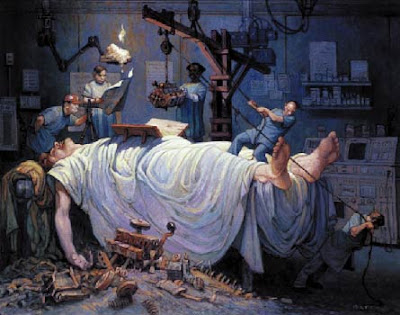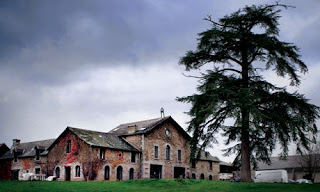So, Samuel P. Huntington discovered the Davos Man in the '90s in his article (later book) on the Clash of Civilizations, an answer to Fukuyama's book The End of History. Fukuyama had ventured that the end of the cold war implied the world's ascent to a plateau of civilization characterized by representative democracy, market economy, and other features mostly associated with the developed western world (earlier post here).
World punditry was shocked, shocked, that history could come to an end like that. I've actually seen not a single pundit recalling the simple fact that Fukuyama wasn't the first to propose the end of history, and that one Georg W.F. Hegel had already proclaimed it in sight of the Prussian state in its emanation of 1830 (semi-constitutional monarchy with strong feudal elements, early capitalism)---a fact that should have served as warning (in my days, the "end-of-history" hypothesis was one of the first things one would know about Hegel, and Hegel was one of the first philosophers one would know, but never mind). The idea in itself is much older, of course; Jesus himself believed that his father had sent him to alert the world to the impending last judgment.
So, Huntington disagreed with Fukuyama. History would continue, and it would do so through a clash of civilizations, the most important one being the conflict between the West and Islam. Very prescient! A few year later, NineEleven.
And the Davos man? Well, the Davos man did not know. The Davos man represented the new world elite, which, according to Huntington, was highly westernized (Harvard, The Economist, Davos World Economic Forum), and so full of itself (the elite) that it was unable to recognize that under its thin veneer of 55 million people (Huntington's estimate), other human layers were actually making up a world population more than 100 times as large. And these people could have very different ideas, and no commitment to the ideals of modern liberalism at all (liberalism here in its European meaning; the American meaning of "liberal" was introduced by FDR, who sought to take a middle ground with his auto-qualification ("I'm a liberal") by distinguishing himself from "radicals" on the one side and "conservatives" on the other). And while the Davos man continued to agree with himself, the rest of the world wouldn't, and could do funny things, like stoning adulterating women, dreaming of a new caliphate, hating minorities, and so on. (Just in case you don't know: Restoring the caliphate is the corporate goal of Al Quaida).
We know now what the Davos man does when he's not in Davos---he runs the world. But what does he do when he is in residence? Good question. Stay tuned. Thread continues here (in a sense).
PS: A propos caliphate: now we have it, ISIS proclaims itself as such with a new Caliph in charge.
World punditry was shocked, shocked, that history could come to an end like that. I've actually seen not a single pundit recalling the simple fact that Fukuyama wasn't the first to propose the end of history, and that one Georg W.F. Hegel had already proclaimed it in sight of the Prussian state in its emanation of 1830 (semi-constitutional monarchy with strong feudal elements, early capitalism)---a fact that should have served as warning (in my days, the "end-of-history" hypothesis was one of the first things one would know about Hegel, and Hegel was one of the first philosophers one would know, but never mind). The idea in itself is much older, of course; Jesus himself believed that his father had sent him to alert the world to the impending last judgment.
So, Huntington disagreed with Fukuyama. History would continue, and it would do so through a clash of civilizations, the most important one being the conflict between the West and Islam. Very prescient! A few year later, NineEleven.
 |
| Kaboom |
And the Davos man? Well, the Davos man did not know. The Davos man represented the new world elite, which, according to Huntington, was highly westernized (Harvard, The Economist, Davos World Economic Forum), and so full of itself (the elite) that it was unable to recognize that under its thin veneer of 55 million people (Huntington's estimate), other human layers were actually making up a world population more than 100 times as large. And these people could have very different ideas, and no commitment to the ideals of modern liberalism at all (liberalism here in its European meaning; the American meaning of "liberal" was introduced by FDR, who sought to take a middle ground with his auto-qualification ("I'm a liberal") by distinguishing himself from "radicals" on the one side and "conservatives" on the other). And while the Davos man continued to agree with himself, the rest of the world wouldn't, and could do funny things, like stoning adulterating women, dreaming of a new caliphate, hating minorities, and so on. (Just in case you don't know: Restoring the caliphate is the corporate goal of Al Quaida).
We know now what the Davos man does when he's not in Davos---he runs the world. But what does he do when he is in residence? Good question. Stay tuned. Thread continues here (in a sense).
PS: A propos caliphate: now we have it, ISIS proclaims itself as such with a new Caliph in charge.


























